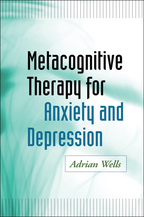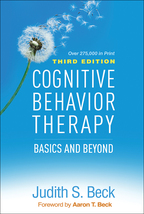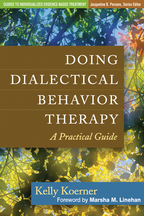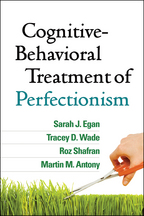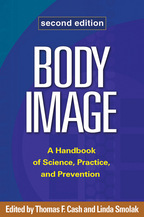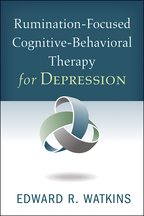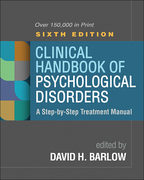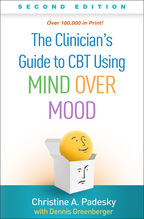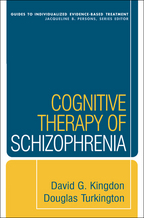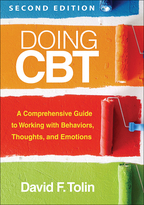Metacognitive Therapy for Anxiety and Depression
Adrian Wells
HardcoverPaperbacke-bookprint + e-book
Hardcover
orderOctober 9, 2008
ISBN 9781593859947
Price: $83.00 316 Pages
Size: 6" x 9"
Paperback
orderMarch 14, 2011
ISBN 9781609184964
Price: $55.00316 Pages
Size: 6" x 9"
“Adrian Wells' publication of MCT is an excellent practical guide for practitioners and provides substantial scientific evidence. This book will be of great value to post-graduate students, researchers, academicians, clinicians, and practitioners.”

—Anxiety, Stress, and Coping
“In sum, MCT is a new and novel treatment and an exciting addition to the third wave of behavior therapy....Serves as a repository/summary of [Wells'] work to date—a treatment manual that combines his theories, conceptualizations, assessment measures, and interventions into a cohesive approach....Therapists trained in more traditional CBT will undoubtedly be very interested in how some of the MCT techniques might work with their current patients who are seemingly 'stuck' using more traditional cognitive techniques.”

—PsycCRITIQUES
“This book will be relevant and of interest to psychologists, psychiatrists, and other mental health care workers, as well as students of these disciplines....4 Stars!”

—Doody's Review Service
“Wells has written a very important book, rich in clinical understanding and practical guidance. Metacognitive therapy is based on a well-developed and thoroughly tested model that addresses core disordered processes, including attentional bias and rumination. The procedures he describes will be enormously useful to therapists of all persuasions, and can form the bedrock of low-intensity and high-intensity interventions for a wide range of disorders.”

—Chris R. Brewin PhD, Department of Clinical, Educational, and Health Psychology (Emeritus), University College London, United Kingdom
“Metacognitive Therapy for Anxiety and Depressionoffers a strategy for addressing those well-learned and hard-to-fix thinking patterns that can be tough to change. As a clinician who has struggled with helping people work through dysfunctional thinking patterns, I can appreciate the usefulness of Wells's methods. Metacognitive therapy helps both the patient and the therapist take a step back from the sometimes repetitive work of cognitive therapy, and lends a new perspective with the potential for breaking through treatment roadblocks. Well done!”

—Monica Ramirez Basco, PhD, Associate Director for Science Policy, Planning, and Analysis, Office of Research on Women's Health, National Institutes of Health
“The metacognitive model is based on years of research on the nature of different levels and processes of thinking underlying psychological disorders. Clinicians who read this revolutionary book will be able to utilize techniques found nowhere else. Intriguing, creative, and effective clinical strategies are illustrated with clear case examples that demonstrate how to modify recurrent patterns of rumination, worry, and overreliance on problematic processes of thinking. Chapters on specific disorders provide tools and conceptualizations that take the cognitive model in new and exciting directions. I highly recommend this brilliant contribution.”

—Robert L. Leahy, PhD, Department of Psychiatry, Weill Cornell Medical College, New York Presbyterian Hospital
“This book presents a new and innovative approach that focuses on how patients think, as much as what they believe. It is firmly grounded in basic science and packed full of powerful clinical strategies for helping people change the way they think. Wells shows how attention training and detached mindfulness techniques can be applied to a full array of anxiety and depressive disorders with impressive and lasting results. His approach will appeal to clinical practitioners, students, and mental health researchers alike, and should find widespread acceptance in the clinical community. It should prove to be a valuable tool for graduate training across professional disciplines.”

—Steven D. Hollon, PhD, Gertrude Conaway Vanderbilt Professor of Psychology, Vanderbilt University
—Anxiety, Stress, and Coping
“In sum, MCT is a new and novel treatment and an exciting addition to the third wave of behavior therapy....Serves as a repository/summary of [Wells'] work to date—a treatment manual that combines his theories, conceptualizations, assessment measures, and interventions into a cohesive approach....Therapists trained in more traditional CBT will undoubtedly be very interested in how some of the MCT techniques might work with their current patients who are seemingly 'stuck' using more traditional cognitive techniques.”
—PsycCRITIQUES
“This book will be relevant and of interest to psychologists, psychiatrists, and other mental health care workers, as well as students of these disciplines....4 Stars!”
—Doody's Review Service
“Wells has written a very important book, rich in clinical understanding and practical guidance. Metacognitive therapy is based on a well-developed and thoroughly tested model that addresses core disordered processes, including attentional bias and rumination. The procedures he describes will be enormously useful to therapists of all persuasions, and can form the bedrock of low-intensity and high-intensity interventions for a wide range of disorders.”
—Chris R. Brewin PhD, Department of Clinical, Educational, and Health Psychology (Emeritus), University College London, United Kingdom
“Metacognitive Therapy for Anxiety and Depressionoffers a strategy for addressing those well-learned and hard-to-fix thinking patterns that can be tough to change. As a clinician who has struggled with helping people work through dysfunctional thinking patterns, I can appreciate the usefulness of Wells's methods. Metacognitive therapy helps both the patient and the therapist take a step back from the sometimes repetitive work of cognitive therapy, and lends a new perspective with the potential for breaking through treatment roadblocks. Well done!”
—Monica Ramirez Basco, PhD, Associate Director for Science Policy, Planning, and Analysis, Office of Research on Women's Health, National Institutes of Health
“The metacognitive model is based on years of research on the nature of different levels and processes of thinking underlying psychological disorders. Clinicians who read this revolutionary book will be able to utilize techniques found nowhere else. Intriguing, creative, and effective clinical strategies are illustrated with clear case examples that demonstrate how to modify recurrent patterns of rumination, worry, and overreliance on problematic processes of thinking. Chapters on specific disorders provide tools and conceptualizations that take the cognitive model in new and exciting directions. I highly recommend this brilliant contribution.”
—Robert L. Leahy, PhD, Department of Psychiatry, Weill Cornell Medical College, New York Presbyterian Hospital
“This book presents a new and innovative approach that focuses on how patients think, as much as what they believe. It is firmly grounded in basic science and packed full of powerful clinical strategies for helping people change the way they think. Wells shows how attention training and detached mindfulness techniques can be applied to a full array of anxiety and depressive disorders with impressive and lasting results. His approach will appeal to clinical practitioners, students, and mental health researchers alike, and should find widespread acceptance in the clinical community. It should prove to be a valuable tool for graduate training across professional disciplines.”
—Steven D. Hollon, PhD, Gertrude Conaway Vanderbilt Professor of Psychology, Vanderbilt University

